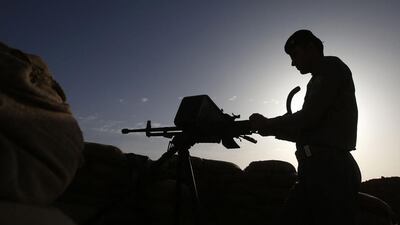ERBIL // Residents of Ramadi are bracing for the next round of bloodletting as pro-government Iraqi militias massed on Tuesday to flush out ISIL, days after the city fell to the extremists.
Around 3,000 fighters from the Popular Mobilisation Units have already moved to the Habbaniya military base 30 kilometres from Ramadi, which fell over the weekend when ISIL overwhelmed its last defenders after months of fighting.
The battle to retake Ramadi, the capital of Anbar province, is expected to be fierce. The insurgents are not only buoyed by their success, but their firepower has been significantly boosted by the capture of military hardware left behind by the retreating Iraqi security forces.
The demoralised government fighters left behind at least 30 armoured cars, as well as large quantities of rifles and ammunition. They even abandoned 10 US build M1A1 Abrahams main battle tanks, although these machines can be shut down via satellite and so rendered useless to ISIL.
Once in control of the city, the militants resorted to the brutal methods that has become a grim trademark of the group. At least 500 people have been killed in the fighting and its aftermath, according to the Anbar provincial council, and witnesses recounted to Reuters the mass execution of members of the security forces and tribal fighters that opposed the ISIL onslaught.
The fighting and the atrocities committed by ISIL have triggered another exodus from the city. The United Nations estimated that almost 25,000 civilians had fled by Monday. Several thousand families are fleeing for a second time in a month, the UN said, after around 180,000 people left Ramadi when the insurgents began gaining ground in April.
Many of Ramadi’s inhabitants fear not only the ISIL terror, but also the push back from Baghdad.
The use of the mainly Shiite Popular Mobilisation Units, also known as Hashd Al Shaabi, in the predominantly Sunni province of Anbar could lead to sectarian reprisals against the local population. Their first major deployment came during the liberation of Tikrit – the hometown of Saddam Hussein – in April, when they drew criticism for human rights violations and the widespread destruction of property.
Yet after the crushing defeat of Iraq’s regular forces in Ramadi, prime minister Haider Al Abadi ordered in the paramilitaries on Sunday. Faced with the loss of its capital, the Anbar provincial council welcomed the decision, in spite of the mistrust between the two communities.
“There is a realisation from those who may have previously rejected [the Hashd’s] role in Anbar, that it is necessary given the current situation in Ramadi,” said Renad Mansour, a non-resident scholar from the Carnegie Middle East Center.
Much attention has focused on Iran's involvement in Iraq, and one of the most poignant images of the battle for Tikrit in Salahuddin province was of Qassem Suleimani, the influential commander of the Quds Force, openly directing some of the units taking part in the fighting.
But many of the groups have a more nationalist leaning, and are motivated by Grand Ayatollah Ali Sistani and his call for a unified struggle against ISIL, taking some of the edge off the sectarian divide.
“The Hashd itself is made up of a number of different groups, some closer to Sistani, and some closer to Iran,” said Mr Mansour. “The former represents Sistani’s wishes, which are to liberate Iraqi lands from ISIL and then restore local governance to the Sunnis. “
Efforts have been made to make the Hashd a more inclusive force. Early in April, Mr Al Abadi met with tribal elders in Anbar to deliver a first batch of weapons to local fighters.
“The popular mobilisation forces have become more diverse. Since the liberation of Tikrit they have incorporated Sunnis and even Christian militias,” said Luay Al Khatteeb, non-resident fellow in the Brookings Doha Center.
There is no evidence of further weapons deliveries, however, and Mr Al Abadi’s more inclusive agenda is under threat from Shiite hardliners in Baghdad, who have seized upon the Ramadi defeat to rail against Sunnis.
Even if it is retaken quickly, Ramadi has been more than just a blow to morale. The loss of the city has repercussions for plans to recapture Mosul, Iraq’s second largest city that fell to ISIL last June. The poor fighting quality of the Iraqi armed forces, who failed to hold on to Ramadi in spite of its modern equipment and US air support, has also worried the Kurds, vital allies in the campaign to retake Mosul.
“We have a major operation coming up to liberate Mosul, and the performance of the Iraqi security forces is a concern,” says Brigadier General Hajjar, a senior commander in the Kurdish forces.
But regardless of their concerns, the Kurds remain committed to pushing ISIL out of Mosul, said Mr Hajjar.
foreign.desk@thenational.ae

